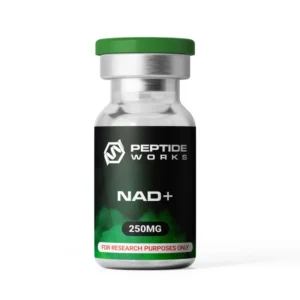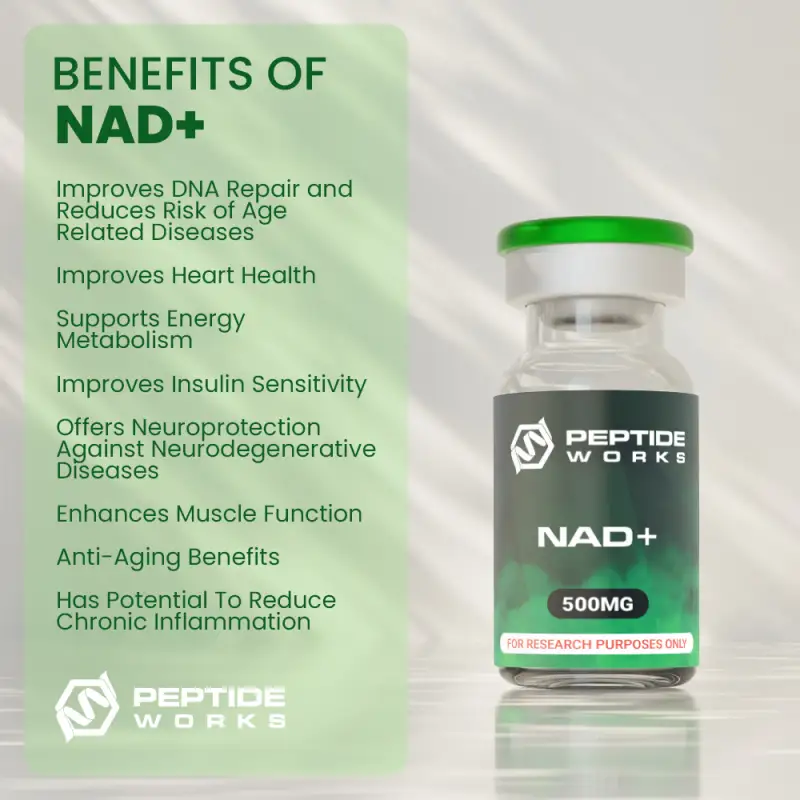PROMO!
First order? Get 10% OFF with this code: 1storder
Our Product Categories

Nicotinamide Adenine Dinucleotide, commonly known as NAD+, is a fundamental coenzyme essential to all living cells. It plays a crucial role in cellular metabolism and energy production. This coenzyme primarily exists in two forms: its oxidized state (NAD+) and its reduced state (NADH). NAD+ peptide from Peptide Works is distinct from the coenzyme itself. It is a synthetic compound specifically designed to enhance or replicate the effects of the natural NAD+ within the body.
These peptides are specially developed to enhance the absorption, stability, and precise delivery of NAD+ to targeted tissues or cells. As we age, NAD+ levels naturally decline, which can result in lower cellular energy, impaired DNA repair, and increased oxidative stress. With its potential to combat age-related decline, NAD+ is a promising therapeutic agent for treating neurodegenerative diseases, metabolic disorders, and other health conditions.
Molecular Formula: C21H27N7O14P2
Molecular Weight: 663.4 g/mol
Synonyms: NAD Plus, Nicotinamide Adenine Dinucleotide
View the NAD+ Certificate Of Analysis (COA)

NAD+ peptides boost NAD+ levels, a molecule essential for cellular energy production and overall health. They enhance energy efficiency by supporting ATP production in cells and activate sirtuins, enzymes linked to DNA repair, inflammation control, and metabolism. This helps protect cells, improve metabolic function, and promote healthy aging.
NAD+ peptides support DNA repair and combat oxidative stress, helping cells maintain genomic stability and reduce damage from aging and environmental factors. By improving these processes, they enhance cellular survival, strengthen immunity, and boost stress response, leading to better overall cellular performance, energy, resilience, and well-being.
Buy NAD+ Peptide Vial from Peptide Works. Each vial contains high-purity lyophilized peptide available in 250 mg and 500 mg options, supplied individually or as complete kits that include bacteriostatic water and syringes for effortless preparation.
Improved Energy Metabolism and Mitochondrial Function:Research suggests our cells’ ability to produce energy and sustain proper mitochondrial function depends heavily on NAD⁺. This coenzyme plays a key role in vital metabolic functions such as oxidative phosphorylation, the primary mechanism by which our cells generate ATP in the mitochondria, and glycolysis, the process by which glucose is converted into energy [1]. Unfortunately, our NAD⁺ levels decrease with age, which can result in a number of metabolic problems as well as age-related health issues.
Nicotinamide Riboside (NR) and other NAD⁺-boosting supplements have shown promise in scientific studies for raising NAD⁺ levels. For instance, NR was shown to improve brain function and lower inflammation while raising the amount of NAD⁺ in the brain in Parkinson’s disease patients in a Phase I trial [2].
Another study found that NR was well tolerated, raised blood NAD⁺ levels in healthy older adults, and may help with energy balance and heart health. This suggests that it might be used therapeutically to treat age-related ailments [3].
DNA Repair, Genomic Stability, and Aging: NAD⁺ is essential for DNA repair through PARP enzymes, maintaining genomic stability and preventing cell senescence. Age-related declines in NAD⁺ reduce repair capacity, leading to DNA damage accumulation and aging-related diseases [4].
In a DNA repair-deficient Alzheimer’s mouse model, NAD⁺ precursor treatment reduced DNA damage, neuroinflammation, and neuronal death while improving cognitive function and synaptic plasticity.
NAD⁺ also supports sirtuin activity, which regulates chromatin remodeling and cellular health. Restoring NAD⁺ levels shows promise in mitigating neurodegeneration, preserving genomic stability, and slowing aging-related processes, highlighting its therapeutic potential for age-related diseases like Alzheimer’s [5].
Cognitive, Vascular, and Neuroprotective Effects:NAD⁺ research has shown potential advantages for neuroprotection, vascular health, and cognition. Nicotinamide Riboside (NR) and other NAD⁺ precursors address important aspects of cognitive decline by lowering oxidative stress, promoting mitochondrial function, and having anti-inflammatory properties [6].
According to a pilot study, NR enhanced endothelial function, cerebrovascular response, and cognitive function in older adults with peripheral artery disease (PAD) [7]. Preclinical research also shows that NAD⁺ helps improve learning and memory in models of aging, vascular dementia, and Alzheimer’s disease by reducing inflammation, apoptosis, and mitochondrial dysfunction [8]. According to these results, NAD⁺ precursors may be able to prevent age-related vascular and cognitive decline, which calls for more clinical study.
Immune System and Inflammation Regulation: Research shows that NAD⁺ plays a critical role in immune regulation by influencing immune cell activation and differentiation, particularly in macrophages and T-cells. Studies have demonstrated that it supports metabolic reprogramming during immune responses, helping maintain immune homeostasis and modulating inflammation [9].
Declining NAD⁺ levels with age contribute to chronic inflammation, but supplementation with NAD⁺ precursors like Nicotinamide Riboside (NR) has shown promise. Human studies reveal that NR supplementation reduces pro-inflammatory cytokines, such as IL-6 and TNF-α, in older adults [10]. These findings suggest that boosting NAD⁺ levels may help regulate immune function, reduce inflammation, and offer therapeutic potential for age-related and inflammatory diseases.
Skin Health and Cancer Prevention: In high-risk patients, nicotinamide (NAM), a NAD⁺ intermediate, has been demonstrated to lower the incidence of keratinocyte carcinoma (KC), most likely via NAD⁺-mediated processes like improved DNA repair and cellular defense. By preserving genomic stability, NAD⁺ aids in the prevention of carcinogenic mutations. New research indicates that nicotinamide mononucleotide (NMN) and nicotinamide riboside (NR), two other NAD⁺ precursors, may increase NAD⁺ levels more efficiently than NAM, potentially providing even stronger protection against age-related diseases and skin cancer [11].
[1] A J Covarrubias, R Perrone, A Grozio, and E Verdin (2021) NAD+ metabolism and its roles in cellular processes during ageing – Nature Reviews: Molecular Cell Biology, 2021 Feb, Volume 22 (Issue 2), Pages 119-141.
[2] B Brakedal, C Dölle, F Riemer, et al (2022) The NADPARK study: A randomized phase I trial of nicotinamide riboside supplementation in Parkinson’s disease – Cell Metabolism, 2022 Mar 1, Volume 34 (Issue 3), Pages 396-407.e6.
[3] C R Martens, B A Denman, M R Mazzo, et al (2018) Chronic nicotinamide riboside supplementation is well-tolerated and elevates NAD+ in healthy middle-aged and older adults – Nature Communications, 2018 Mar 29, Volume 9, Page 1286.
[4] H B S Griffiths, C Williams, S J King, and S J Allison (2020) Nicotinamide adenine dinucleotide (NAD+): essential redox metabolite, co-substrate and an anti-cancer and anti-ageing therapeutic target – Biochemistry Society Transactions, 2020 Jun 30, Volume 48 (Issue 3), Pages 733-744.
[5] Y Hou, S Lautrup, S Cordonnier, et al (2018) NAD+ supplementation normalizes key Alzheimer’s features and DNA damage responses in a new AD mouse model with introduced DNA repair deficiency – Proc Natl Acad Sci U S A, 2018 Feb 20, Volume 115 (Issue 8), Pages E1876-E1885.
[6] J M Campbell (2022) Supplementation with NAD+ and Its Precursors to Prevent Cognitive Decline across Disease Contexts – Nutrients, 2022, Volume 14 (Issue 15), Page 3231.
[7] Z Szarvas, Z A Reyff, A Peterfi, et al (2025) Effects of NAD+ supplementation with oral nicotinamide riboside on vascular health and cognitive function in older adults with peripheral artery disease: Results from a pilot 4-week open-label clinical trial – Journal of Pharmacology & Experimental Therapeutics, 2025 Jul, Volume 392 (Issue 7), Page 103607.
[8] M Abdulrazzaq Qader, L Hosseini, N Abolhasanpour, et al (2025) A systematic review of the therapeutic potential of nicotinamide adenine dinucleotide precursors for cognitive diseases in preclinical rodent models – BMC Neuroscience, 03 March 2025, volume 26 (Article number 17).
[9] R Mann, V Stavrou, and S Dimeloe (2025) NAD + metabolism and function in innate and adaptive immune cells – Journal of Inflammation, 01 August 2025, Volume 22, Article number: 30.
[10] K A Freeberg, CA C Udovich, C R Martens, et al (2023) Dietary Supplementation With NAD+-Boosting Compounds in Humans: Current Knowledge and Future Directions – The Journals of Gerontology: Series A, Volume 78, Issue 12, December 2023, Pages 2435–2448.
[11] B J Kahn, M R Borrelli, and T Libby (2022) A Narrative Review of Nicotinamide Adenine Dinucleotide (NAD)+ Intermediates Nicotinamide Riboside and Nicotinamide Mononucleotide for Keratinocyte Carcinoma Risk Reduction – J Drugs Dermatol. 2022, Volume 21 (Issue 10), Pages 1129-1132.
The answers to the most frequently asked questions about NAD+.

Boosting NAD+ supports the body’s natural processes that keep cells healthy and active. It helps maintain energy production, DNA repair, and stress response, which can slow some visible and functional effects of aging. While it cannot reverse aging, maintaining higher NAD+ levels may promote stronger cellular performance and overall vitality as the body grows older.
NAD+ supports the body and brain in producing and using energy. Higher NAD+ activity may enhance mental clarity by helping neurons function more efficiently, which could reduce feelings of brain fog. It also helps regulate the balance of chemicals involved in mood and relaxation. By supporting steady energy flow and recovery, NAD+ may help the body maintain focus, calmness, and healthy sleep patterns.
NAD+ is used as a research peptide and not approved for therapeutic or supplement use. Reported effects in studies include mild nausea, headache, dizziness, fatigue, or stomach discomfort, particularly with higher doses or IV delivery. Temporary flushing or muscle cramps may also occur. Serious side effects are rare. NAD+ should only be handled and administered in controlled research environments by qualified professionals.
NAD+ is legal to buy in the United States when sold for research purposes only. It is not approved by the Food and Drug Administration (FDA) for human or medical use. NAD+ is intended for laboratory studies and experimental testing under controlled conditions. Regulations for NAD+ vary across regions, so buyers should review and follow local laws before making a purchase.

This blog explores the science of energy production, focusing on how NAD+ supplements help support cellular vitality. It also looks at how NAD+, Tesofensine and Sermorelin work to enhance energy, metabolism, and recovery. From improving mitochondrial function to boosting resting energy expenditure, the article highlights new research that is shaping the future of energy optimization.

NAD Therapy is a cutting-edge topic in brain health research, focusing on NAD+ (a vital coenzyme) and its role in energy production, DNA repair and neuron protection. This blog explores how NAD+ and peptides like Semax and P21 may enhance memory, focus, and learning, offering promising insights into cognitive performance and resilience.

This blog explores longevity peptides such as Epithalon, NAD+, and MOTS-c, focusing on their roles in DNA repair, telomerase activation and overall cellular health. It explains how these peptides may help slow aging, reduce inflammation and support metabolism. Peptide Works provides these compounds for research, helping advance scientific understanding of aging and cellular resilience.
ALL CONTENT AND PRODUCT INFORMATION AVAILABLE ON THIS WEBSITE IS FOR EDUCATIONAL PURPOSES ONLY.
DISCLAIMER: These products are intended solely as a research chemical only. This classification allows for their use only for research development and laboratory studies. The information available on our Peptide Works website: https://peptide-works.com/ is provided for educational purposes only. These products are not for human or animal use or consumption in any manner. Handling of these products should be limited to suitably qualified professionals. They are not to be classified as a drug, food, cosmetic, or medicinal product and must not be mislabelled or used as such.